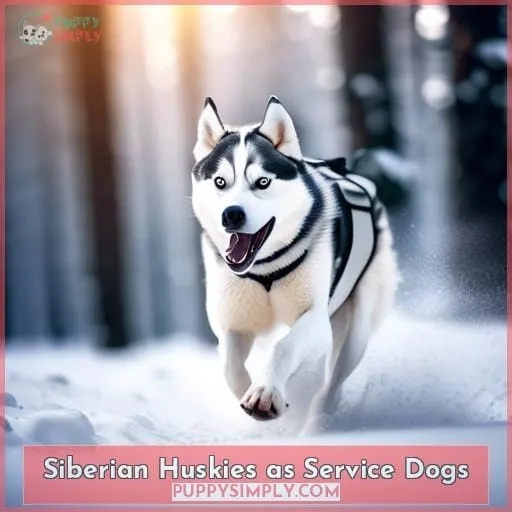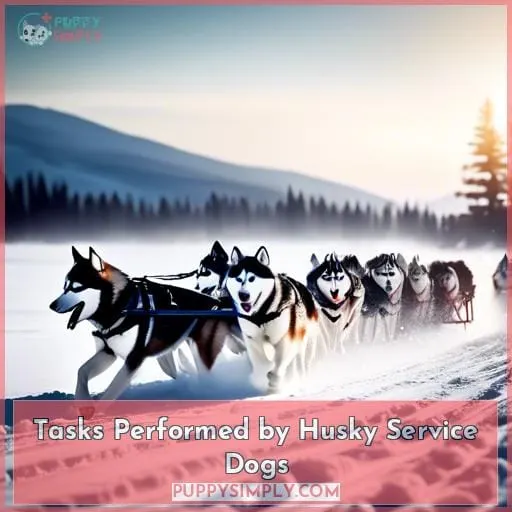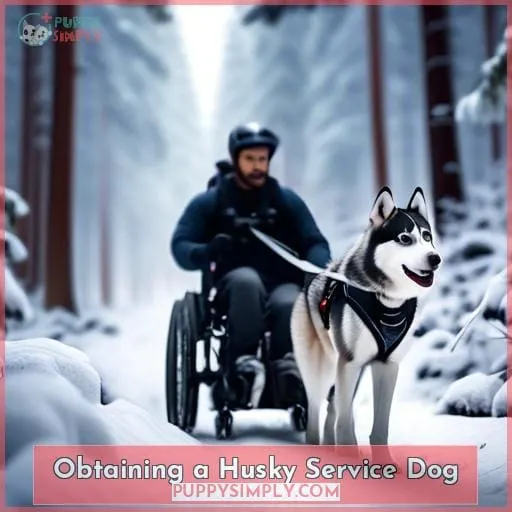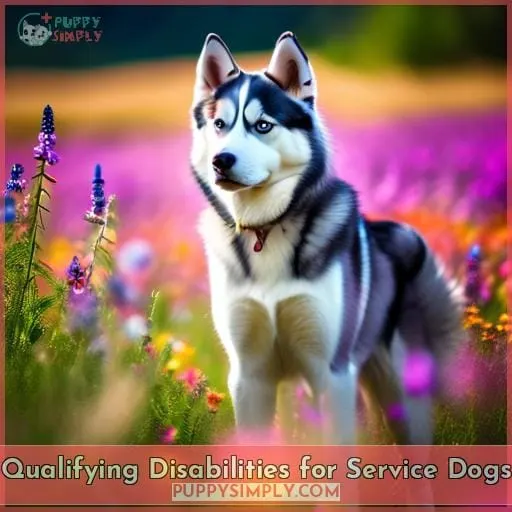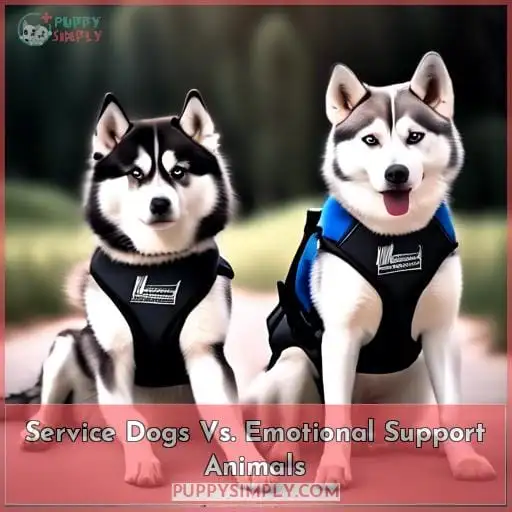This site is supported by our readers. We may earn a commission, at no cost to you, if you purchase through links.

But that doesn’t mean they aren’t capable of being one.
In fact, they can be an excellent choice, with their intelligence, strength, loyalty, and love for humans.
In this guide, we’ll help you uncover the world of husky service dogs, from finding one to living with one.
Discover the joys of having a husky service dog by your side.
Table Of Contents
- Key Takeaways
- Siberian Huskies as Service Dogs
- What Makes Huskies Suitable Service Dogs?
- Tasks Performed by Husky Service Dogs
- Obtaining a Husky Service Dog
- Can I Train My Own Husky Service Dog?
- Where to Adopt a Husky Service Dog
- Qualifying Disabilities for Service Dogs
- The Americans With Disabilities Act (ADA)
- Airline Pet Policies
- Service Dogs Vs. Emotional Support Animals
- Frequently Asked Questions (FAQs)
- What are the behavioral challenges commonly seen in Huskies that might require training or behavior modification?
- What are the typical health problems that Huskies might experience, and how can these be managed?
- How much exercise do Huskies typically need, and what are some suitable activities to keep them physically and mentally stimulated?
- How long do Huskies typically live, and what are some common reasons for their passing?
- What are the best ways to prepare a Husky for adoption, including socialization, training, and acclimating them to a new home environment?
- Conclusion
Key Takeaways
- Siberian Huskies excel as service dogs due to their intelligence, loyalty, and trainability. They assist individuals with disabilities in various tasks, from search and rescue to psychiatric support.
- Husky service dogs perform specialized tasks, including search and rescue, guiding the visually impaired, providing psychiatric support, behavioral modification, and addressing unwanted behaviors like digging.
- Obtaining a Husky service dog requires a diagnosis from a mental health professional and considerations for training, financial implications, and a lifelong commitment to caring for and training the dog.
- Service dogs have equal access to public places and accommodations under the Americans with Disabilities Act (ADA). They are distinct from emotional support animals and have specific legal protections and roles.
Siberian Huskies as Service Dogs
Siberian Huskies are intelligent and loyal dogs that make excellent service dogs for individuals with various disabilities.
Their unwavering loyalty and intuitive nature make them ideal companions for those in need.
Huskies excel in various tasks, from search and rescue to psychiatric support, providing invaluable assistance to their handlers.
Training a Husky as a service dog requires dedication and patience, but the rewards are immense.
These dogs are highly trainable and eager to please, making them responsive to commands and instructions.
With consistent training, Huskies can master complex tasks and become indispensable aids to their owners.
While Huskies thrive in cold climates, they may struggle in hot or humid environments.
Their thick double coats can make them uncomfortable in warm weather, so it’s crucial to provide them with adequate shade and water.
Huskies are also known for their vocal nature, so apartment living may not be ideal for them.
Introducing a Husky into a family with children requires careful consideration.
Huskies are generally good with kids, but proper supervision is essential to ensure everyone’s safety.
Huskies have a strong pack mentality, so introducing them to other pets should be done gradually and under controlled circumstances.
The story of Taysia Blue, a Siberian Husky rescued from a shelter, highlights the profound impact these dogs can have on our lives.
Taysia Blue’s unwavering spirit and resilience inspired her owner, Jackie, to start a rescue organization dedicated to saving Siberian Huskies in need.
What Makes Huskies Suitable Service Dogs?
Huskies are smart, strong, and loyal dogs.
They have a natural love for humans, making them ideal service dogs.
Their sled dog skills can also be helpful in search-and-rescue operations, making them versatile companions.
Intelligence
Their intelligence makes Huskies exceptional candidates for service work.
Their cognitive abilities and problem-solving skills allow them to learn various tasks and excel in training.
Huskies’ intelligence, combined with their loyalty, makes them ideal partners for those in need.
Strength
You’ll often find Huskies assisting people with physical disabilities due to their remarkable strength.
Husky strength aids in wheelchairs and mobility tasks.
Muscular Huskies lift, pull, and carry objects with ease.
Siberian strength supports individuals during daily activities.
Strength training enhances Huskies’ physical abilities.
Loyalty
Your Husky’s loyalty means they’ll bond with you, dedicated to helping you.
Bonding Benefits:
- Trustworthy Companions
- Emotional Allegiance
Canine Fidelity:
- Unwavering Devotion
- Sled Dog Obedience
Love for Humans
Moving from their loyalty, you’ll also find Huskies to be extremely affectionate and eager to please their humans.
Human Bond:
Huskies crave companionship and form deep emotional connections with their owners.
Canine Affection:
They show their love through playful antics, gentle cuddles, and soulful gazes.
Unconditional Love:
Huskies offer unwavering support, providing comfort and joy during life’s ups and downs.
Sled Dog Skills
With their roots as sled dogs, Huskies possess exceptional strength and endurance, making them well-suited for assisting you with physically demanding tasks.
Husky Sled Dog Skills:
- Strength and Endurance: Supports you in physically demanding tasks.
- Winter Adaptation: Navigates challenging terrains.
- Pack Mentality: Collaborates effectively with you.
- Loyalty and Dedication: Remains by your side, always ready to serve.
- Trainability: Adapts to various service roles.
Benefits to Service Work:
- Supports you in physically demanding tasks.
- Navigates challenging terrains.
- Collaborates effectively with you.
- Remains by your side, always ready to serve.
- Adapts to various service roles.
Tasks Performed by Husky Service Dogs
As you explore the world of Husky service dogs, know they can be trained for varied tasks.
From search and rescue to guiding the visually impaired or offering psychiatric support, Huskies can be trained to assist you with your specific needs.
With consistent training and effort, Huskies can become your capable and devoted service companions.
Search and Rescue
While their intelligence, strength, and loyalty make them ideal candidates, Huskies’ keen sense of smell and natural tracking abilities also make them exceptional search-and-rescue dogs.
Wilderness Rescue: Huskies excel in locating lost hikers and downed aircraft.
Urban Search: They detect survivors trapped in collapsed buildings or disaster zones.
Avalanche Response: Their skills save lives during snow emergencies.
Guiding the Visually Impaired
Your Husky service dog can lead you confidently through busy streets, guiding you safely to your destinations.
Training Techniques:
- Positive reinforcement
- Clicker training
- Voice commands
Bonding Methods:
- Affection and praise
- Regular play sessions
- Gentle leash guidance
Daily Routines:
- Consistent schedule
- Mental stimulation
- Socialization
Environmental Adaptations:
- Removing obstacles
- Providing audio cues
- Teaching obstacle avoidance
Success Stories:
- Increased independence
- Enhanced quality of life
- A sense of security
Psychiatric Support
One can also train their Husky to provide psychiatric support, offering comfort and assistance during moments of anxiety or distress.
Offer a calming presence.
Provide deep pressure therapy.
Interrupt negative thoughts.
Other Tasks With Training
With enough training, your Husky service dog can assist you with a wide range of other tasks:
- Behavioral modification
- Digging prevention
- Alerting you to potential dangers
They can be your trusted companion and a valuable asset in your daily life.
Obtaining a Husky Service Dog
To obtain a Husky service dog, you’ll need a diagnosis from a licensed mental health professional.
They’ll assess your disability and determine if a Husky service dog can help.
Once you have a diagnosis, you can start training your Husky or seek out a trained service dog.
There are several ways to train a Husky service dog.
You can work with a professional dog trainer, enroll in an online PSD training program, or train your Husky yourself.
If you choose to train your Husky yourself, be prepared to put in a lot of time and effort.
Huskies can be stubborn and challenging to train, but with consistent effort, they can learn to perform a variety of tasks.
Before you obtain a Husky service dog, consider the financial implications.
Service dogs can be expensive to train and care for.
You’ll need to factor in the cost of food, veterinary care, and training.
You may also need to purchase special equipment for your service dog, such as a harness or a vest.
Finally, remember that service dogs aren’t just pets.
They’re working animals that provide essential support to their handlers.
If you’re considering getting a Husky service dog, be prepared to make a lifelong commitment to caring for and training your dog.
Can I Train My Own Husky Service Dog?
Training your own Husky service dog is an option, though it requires dedication, patience, and adherence to specific training guidelines.
You must have the time, resources, and commitment to ensure your Husky receives the proper training and socialization.
Before embarking on this journey, consider your lifestyle, living situation, and local laws and regulations regarding service dogs.
If you decide to train your Husky, seek guidance from experienced professionals, such as certified dog trainers or reputable service dog training programs.
These experts can provide invaluable insights and techniques to help you effectively train your Husky to perform the tasks necessary for assisting you with your disability.
Keep in mind that training a service dog is a long-term commitment, and you must be prepared to invest significant time and effort into the process.
It’s crucial to address any behavioral challenges that may arise during training, ensuring your Husky is well-behaved and obedient in various situations.
Legal considerations are also essential. Familiarize yourself with the Americans with Disabilities Act (ADA) and any local or state laws governing service dogs in your area.
Ensure your Husky meets the legal requirements and carries the appropriate identification and documentation.
Where to Adopt a Husky Service Dog
You can adopt a Husky service dog from breed-specific rescues and shelters that specialize in finding homes for these loyal and intelligent dogs.
These organizations often have a network of foster homes where the dogs receive care and training before being placed in permanent homes.
Another option is to adopt a Husky from a breeder who specializes in breeding service dogs.
These breeders typically have a rigorous selection process to ensure that their dogs have the temperament and qualities necessary to be successful service dogs.
Before adopting a Husky service dog, you’ll need to go through an evaluation process to determine if you qualify for a service dog and if a Husky is the right breed for you.
This process typically involves submitting a written application, providing documentation of your disability, and participating in an interview.
Once you’ve been approved for a service dog, you’ll need to choose a reputable rescue organization or breeder.
Be sure to do your research and ask plenty of questions to ensure that you’re getting a healthy, well-trained dog from a responsible source.
Qualifying Disabilities for Service Dogs
Moving along to qualifying disabilities, it’s important to know that to qualify for a service dog, you must have a disability that substantially limits one or more major life activities.
This can include mental health conditions like depression, anxiety, and PTSD, as well as physical disabilities such as blindness, deafness, and mobility impairments.
The Americans with Disabilities Act (ADA) defines a service dog as a dog that’s individually trained to do work or perform tasks for an individual with a disability.
Service dogs aren’t pets and aren’t considered emotional support animals.
To obtain a service dog, you’ll need to work with a qualified professional to assess your disability and determine if a service dog is right for you.
If you qualify, you’ll then need to find a reputable breeder or rescue organization that specializes in training service dogs.
The training process for a service dog can be long and intensive, but it’s worth it to have a well-trained dog that can help you live a more independent and fulfilling life.
Service dogs can provide a sense of safety, companionship, and independence, and they can help you perform tasks that would otherwise be difficult or impossible.
If you’re considering getting a service dog, it’s important to do your research and make sure that you understand the legal requirements and training process involved.
With the right dog and the right training, a service dog can make a world of difference in your life.
The Americans With Disabilities Act (ADA)
Under the Americans with Disabilities Act (ADA), you’re entitled to bring your Husky service dog into public places and enjoy equal access to services and accommodations.
The ADA defines service animals as dogs that are individually trained to do work or perform tasks for people with disabilities. This includes physical, sensory, psychiatric, intellectual, or other mental disabilities.
With your Husky service dog, you have the right to enter public spaces like restaurants, stores, theaters, and government buildings. You can also bring your dog on public transportation, including buses, trains, and airplanes.
Businesses and organizations can’t discriminate against you or your service dog.
If you encounter any resistance or discrimination, you can file a complaint with the U.
The ADA also requires businesses to make reasonable accommodations for people with disabilities. This may include providing accessible parking, ramps, and elevators, or allowing service dogs to accompany their handlers in areas where animals are normally prohibited.
In cases where a business refuses to accommodate your service dog, you can take legal action. The ADA has been upheld in numerous court cases, and businesses have been found liable for discrimination against people with disabilities.
You have the right to live your life with dignity and independence, and your Husky service dog is an essential part of that.
Airline Pet Policies
Now, let’s embark on a journey to understand airline pet policies, an integral aspect of air travel with your trusty Husky service dog.
Airlines have varying regulations regarding pet travel, so it’s crucial to research and adhere to their specific requirements.
- Pet Carrier Requirements:
- Ensure you have an airline-approved pet carrier that meets the size and weight restrictions.
- Your furry friend must be able to stand, turn around, and lie down comfortably inside the carrier.
- Breed Restrictions:
- Some airlines may have breed restrictions, especially for larger breeds like Huskies.
- Contact the airline beforehand to confirm if Huskies are allowed on their flights.
- Documentation Needed:
- Prepare the necessary documentation, including your Husky’s vaccination records and a health certificate issued by a licensed veterinarian.
- You may also need proof of your disability and the legitimacy of your service dog.
- In-Cabin vs. Cargo:
- Depending on the airline and the size of your Husky, they may travel either in the cabin with you or in the cargo hold.
- Familiarize yourself with the airline’s policy and make arrangements accordingly.
Service Dogs Vs. Emotional Support Animals
While airline pet policies may have different rules for service dogs, it’s important to understand the distinctions between service dogs and emotional support animals.
Service dogs undergo rigorous training to perform specific tasks that assist individuals with disabilities, while emotional support animals provide comfort and companionship.
Let’s delve into the key differences between these two types of animals:
| Feature | Service Dogs | Emotional Support Animals |
|---|---|---|
| Legal Distinctions | Task-trained to assist with a disability; recognized under the Americans with Disabilities Act (ADA) | Provide comfort and support; not recognized under the ADA |
| Training Methods | Specialized training to perform specific tasks; must pass public access tests | No specific training requirements |
| Public Access Rights | Allowed in public places; must be under control and not disruptive | Not guaranteed public access; may be restricted in certain places |
| Documentation Requirements | Must have a letter from a licensed healthcare professional; may require proof of training | No documentation requirements |
| Supportive Roles | Assist with physical or mental disabilities, such as mobility issues, visual impairments, or psychiatric conditions | Provide emotional support and companionship |
As you can see, there are significant differences between service dogs and emotional support animals. Service dogs are highly trained and provide essential assistance to individuals with disabilities, while emotional support animals offer comfort and companionship.
Understanding these distinctions is crucial for ensuring that both types of animals receive the appropriate support and accommodations.
Frequently Asked Questions (FAQs)
What are the behavioral challenges commonly seen in Huskies that might require training or behavior modification?
Huskies’ stubbornness and independent nature can lead to challenging behaviors:
- Pulling on the leash
- Escaping
- Ignoring commands
Their high prey drive may also require training to prevent chasing small animals.
Patience, consistency, and positive reinforcement can help address these common issues.
What are the typical health problems that Huskies might experience, and how can these be managed?
Huskies may experience:
- Hip dysplasia
- Eye issues
- Thyroid problems
- Skin allergies
Regular checkups, a healthy diet, and exercise can help manage these conditions, ensuring your Husky stays happy and healthy.
How much exercise do Huskies typically need, and what are some suitable activities to keep them physically and mentally stimulated?
Huskies, with their boundless energy, demand an active lifestyle.
Picture them galloping through snowy landscapes, pulling sleds with vigor, their eyes sparkling with exhilaration.
Engage them in brisk walks, invigorating runs, or challenging hikes to match their boundless spirit and keep their minds sharp.
How long do Huskies typically live, and what are some common reasons for their passing?
With proper care, your husky companion can live a fulfilling life of 12 to 15 years.
Common causes of passing include:
- Old age
- Cancer
- Heart disease
Cherish each moment, for their time with you is precious.
What are the best ways to prepare a Husky for adoption, including socialization, training, and acclimating them to a new home environment?
With patience, create a serene sanctuary for your Husky,
A haven where love blooms.
Socialize them gently,
Teaching them to navigate the human world.
Train them with unwavering dedication,
Forging an unbreakable bond.
Conclusion
As you journey through life with your newfound husky service dog, you’ll experience a bond like no other.
They’ll be your steadfast companion, a beacon of hope in the darkest of times.
The love and unwavering loyalty they offer are simply priceless.
Embrace the extraordinary journey of having a husky service dog by your side – it’s a life-changing experience that will redefine your perception of love, loyalty, and companionship.
This guide has equipped you with the knowledge to embark on this incredible adventure.
Now, go forth and uncover the world of husky service dogs – a world filled with love, unwavering support, and boundless possibilities.

